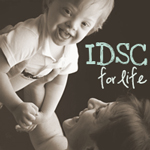I made a page up on Squidoo.com about our book. It creates more publicity about the book and also has a spot for comments to be left (a guestbook) . . . so sign the guestbook and leave a comment about the book!
The link is http://www.squidoo.com/gotdownsyndrome.
~ Qadoshyah
Wednesday, December 17, 2008
Squidoo page on our book
Tuesday, December 2, 2008
In-Womb Treatment For Down’s Syndrome
In-Womb Treatment For Down’s Syndrome
Posted on: Monday, 1 December 2008, 12:50 CST
Scientists are hoping to develop a treatment for mothers who are aware their unborn child has Down’s syndrome.
In a study with mice, scientists used gave nerve-protecting chemicals to unborn mice who had a syndrome similar to Down’s. They found that some of the noticeable developmental problems were removed among those who received the chemicals.
These mice were engineered to have an extra copy of a segment of chromosome 16, because children with Down’s suffer from having an extra copy of chromosome 21. These so-called "trisomic" individuals may also have learning difficulties and symptoms of Alzheimer's later in life.
Other studies have shown similarities between people with Down’s and trisomic mice revealed malfunctions in glial cells - brain cells that regulate the development of neurons by releasing certain proteins.
Researcher Catherine Spong and colleagues at the National Institutes of Health in Bethesda, Maryland sought to determine if the addition of segments of proteins known as NAP and SAL to mice pups would protect the neurons as to prevent developmental delays.
"We were able to prevent a significant amount of the delay," Spong said.
Researchers noted normal levels of ADNP, which is a regulatory protein that is often underproduced in children with Down’s.
Now Spong is watching to see if mice treated as fetuses also display less of a learning deficit as they mature. She hopes that the prenatal treatment might permanently increase the expression of the proteins in question.
Spong hopes her team’s new findings will translate into a workable treatment for humans affected by Down’s.
"I'd love to see these early screening tests lead to therapy and not just termination," said Charles Cantor of Sequenom in San Diego, California, which is developing a non-invasive prenatal blood-screening test for Down's. "It would have a big impact, especially for families that are not willing to consider abortion as an option."






















